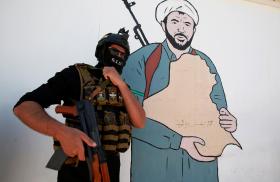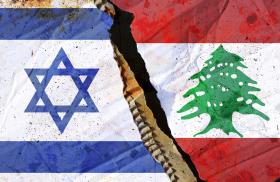The behind-the-scenes conflict between liberal and illiberal forces within Lebanon's political structure is spilling into public view.
In recent weeks, a simmering debate between the two major power centers in domestic Lebanese politics has spilled into public view. This debate pits newly installed Prime Minister Rafiq Hariri, who represents those who want Lebanon to take advantage of Israel's withdrawal from southern Lebanon to focus on internal stability, economic reconstruction and securing foreign investment, against Hizballah leader Shaykh Hassan Nasrallah, who — with the support of Syria and Iran — champions maintaining Lebanon's role on the front line of the ongoing revolutionary resistance against Israel. This tension was described in the Lebanese newspaper an-Nahar as the choice between "Hanoi" (Nasrallah) and "Hong Kong" (Hariri). As with most Middle East crises, the development of this delicate and flammable dispute carries both risks and opportunities for Lebanon and other players on the Middle East scene.
Tensions and Balances in Lebanon At the end of February, Hariri visited Paris and chalked up an impressive diplomatic achievement — an agreement by the World Bank and European lenders to provide Lebanon $458 million in grants and loans, plus additional French and European promises to promote investment in Lebanon. What was especially impressive was not that he overcame the skepticism and conditionality of European bankers, but that he effectively dealt with internal conflicts inside Lebanon that came close to sidetracking his efforts to win such a tidy sum.
That Paris trip was the second one of the month. Two weeks earlier, Hariri had been in the French capital luring European investors with iron-clad promises he said were made in coordination with Syria that the Lebanese government would guarantee no provocations along the Lebanon–Israel border that might invite Israeli retaliation, escalate the border conflict, and scare away investors. No sooner had he given his word that the border would remain quiet did Hizballah launch an attack in the disputed Sheba'a Farms region that left one Israeli soldier dead and three wounded. Embarrassed and furious, Hariri hurried back to Beirut and issued an official statement throwing down the gauntlet to Hizballah. In a thinly veiled attack on the Iranian-backed militia, he said that Israel's May 2000 withdrawal from southern Lebanon "was not an action that one party or another could monopolize." Before the ink was dry on his statement, however, Hariri was summoned to an urgent tete-a-tete with Hizballah representatives. The result was what can be called a "happy ending, Lebanon-style": Hariri retracted his statement, while all sides declared they had reached "a common understanding" to the effect that no conflicts existed among them and agreed to continue acting according to their respective spheres of responsibilities and in mutual coordination. This accord was sealed with Hariri's return to Paris and his achievement described above.
That Hariri was especially nervous about the potential for escalation in the wake of this Hizballah attack was clear. While the Israel Defense Forces (IDF) only reacted with limited retaliation north of the Sheba'a area, as has been the norm in recent months, Chief of Staff Lt. General Sha'ul Mofaz did publicly call upon the government and Prime Minister Ariel Sharon to act more forcefully, declaring that the time has come for a wider response aimed at Hizballah, their Lebanese hosts, and their Syrian patrons.
Such broad-based retaliation might have threatened the core rationale for Hariri's prime ministry — revitalizing Lebanon' s economy. With Lebanon weighted down with $25 billion in debt, much of which accumulated during his last term as premier, Hariri outlined an economic plan based on a comprehensive reorganization of government, privatization of government-owned companies, and aggressive efforts to secure foreign investment, mainly from Western countries. The investment campaign was highlighted in a February 20 meeting between U.S. Ambassador to Lebanon David Satterfield and the Lebanese minister of energy and water, reported in the Lebanese media. According to reports, the discussions centered on the investment opportunities open to American companies, with the Lebanese minister stressing that U.S. firms could make significant contributions to Lebanon. For his part, Satterfield reportedly said that Lebanon's power and water sectors were attractive to U.S. companies but that any substantial investment depended on the Lebanese government assuming its responsibility by restraining Hizballah from engaging in provocations across the Israel-Lebanon border.
That an outside power like the United States might pressure the Lebanese government to clamp down on Hizballah activities was too much for Nasrallah, even in exchange for economic benefits. He responded by attacking the U.S. ambassador personally: "Satterfield and the State Department are not, and have never been, eager for stability in Lebanon and for an atmosphere which encourages investments." Nasrallah's response reflects Hizballah's acute sensitivity to Lebanese public opinion. While the need to avoid appearing as the obstacle to Lebanon's post-war recovery might not lead to a complete halt of Hizballah's activities, it may affect the intensity and frequency of Hizballah provocations or perhaps even convince the organization to channel more of its resources towards support of the "Al-Aqsa Intifada" by directing and facilitating terror attacks inside Israel.
Despite the papering over of their differences, there remains a fundamental, conceptual conflict between Hariri and Nasrallah that is unresolved. Hariri's political survival is dependent upon improving Lebanon's economic situation, which is in turn dependent upon regional stability and the maintenance of calm along the Israel–Lebanon border. In contrast, Hizballah's future and its "Jihadic identity" are inextricably linked to the continuation of operations in the Sheba'a Farms and the preservation of regional instability. Ironically, despite this clash of interests, both parties — who both consider themselves Lebanese patriots — are also dependent on each other for their survival. Hariri cannot provoke Hizballah opposition to his economic plans just as Hizballah cannot provoke the antipathy of the majority of Lebanese who support Hariri's efforts to kick-start the economy.
The Syrian Dilemma This delicate situation inside Lebanon aggravates Syria's internal tensions, too. On the one hand, a low level of instability on the Lebanese–Israeli border serves Syrian national interests vis-a-vis the Golan Heights, reminding Israel that this remains an unresolved sore on its frontiers. On the other hand, cross-border provocations run the risk of provoking Israeli retaliation aimed directly at Syria or at Syrian assets or targets in Lebanon. An attack which sets back Lebanon's economic rehabilitation will harm Syrian interests, since Lebanon is a mainstay of the Syrian economy, both as a source of direct income and "a bridge to the West." It seems, therefore, that the Syrians have a strong interest in supporting Hariri's efforts to attract foreign investments to Lebanon, given that these can provide a financial windfall to Syria that bypasses Syria's archaic bureaucracy and its sluggish economic reforms. Only by Syria supporting Hariri, this argument goes, can Lebanon become Hong Kong to Syria's China.
Lebanon, a Terrorist-supporting State? While the logic of finding a rapprochement between Hariri and Nasrallah may make sense for Bashar al-Asad — who wants to enjoy both the financial benefits Hariri promises and the political benefits Nasrallah can deliver — it may not make sense for the United States to let this minuet proceed. As the April date approaches for the publication of the State Department's annual Patterns of Global Terrorism report, the idea has emerged of adding Lebanon to the list of officially recognized "state sponsors of terrorism." Adding Lebanon to the terror-states list will almost certainly deter Western governments and companies from investing in the country, slowing down and perhaps even preventing Lebanon's economic rehabilitation. The resulting economic strain would highlight to the Lebanese the cost of giving Hizballah and other organizations virtual carte-blanche to maintain their activities against Israel and the West, and might compel the Lebanese populace to force the government to rein in these groups.
According to the relevant statute, Lebanon certainly fits the description of a terror-supporting state. Groups recognized as terrorist organizations — such as Hizballah, Palestinian Islamic Jihad, Hamas, and Osama bin Laden's al-Qaeda, to name a few — operate relatively freely in the country, with no significant governmental effort to limit their activities. Indeed, according to the 1999 Patterns report, "The U.S. was concerned that a variety of terrorist groups operated and trained inside Lebanon with relative impunity. Lebanon was also unresponsive to U.S. requests to bring to justice terrorists who attacked U.S. citizens and property in Lebanon in previous years." Israel's withdrawal from Lebanon should remove any reluctance to punish Lebanon for what could have been, over the years, construed as "resistance to occupation." And if Lebanon is independent enough to merit a U.S. embassy, ambassador, and even a modest military–education financial assistance program to the Lebanon Army, the argument that Lebanon should be immune from this law because it is under Syria's thumb doesn't hold water.
Of course, terrorism sanctions are a blunt instrument and there could be considerable downsides to imposing them on Lebanon. Stymieing Lebanon's economic revival risks undermining the most potent arrow in the quiver of those arguing for political stability as the alternative to the chaos and violence of the past decades. Hariri's showdown with Hizballah upon his return from Paris was only possible because the allure of the euro-loan package was, in the eyes of many Lebanese, overpowering. If Lebanon had been on the terrorism list, the economic counterweight to Hizballah would not exist and the radicals would have the field to themselves.
Threats and Opportunities While the Lebanon situation carries an unusually potent possibility of conflagration, it is important to note that some significant regional components have changed over the past year: Israel withdrew from southern Lebanon and the new men in power — Bashar al-Asad and Hariri — are vigorous leaders who lack military backgrounds, are oriented to internal reform, and are eager for foreign aid and investment. In contrast to the past, this new situation does at least hold the potential for using economic incentives as a lever for affecting the behavior of Lebanon and, indirectly, Syria. Whereas Syrian and Lebanese leaders of the past were incapable of responding nimbly to a comprehensive, multifaceted approach of carrots and sticks, the current stage of transition and internal tension and within these countries may lend itself well to dealing with this sort of policy. The option of adding Lebanon to the terrorism list should the parties spurn legitimate offers remains a legitimate and, under the right circumstances, appropriate tool. Yet the situation in Beirut and Damascus provides new opportunities for the United States to explore the more mutually advantageous option of engaging in a process designed to both promote economic gains and provide regional stability.
Yossi Baidatz is a visiting military fellow at The Washington Institute. This PolicyWatch was produced with the assistance of Rachel Stroumsa.
Policy #523

